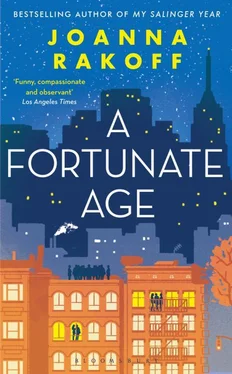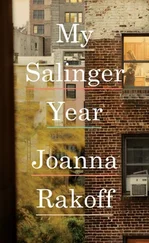“Mama, out ,” said Jack.
“Okay, sweetie,” said Sadie, depositing her own pink cup of coffee on the bench. She knelt in front of him, doubled the knots on his red canvas sneakers, and unbuckled the stroller’s belt.
“Ga,” shouted Jack, taking her hand and pulling her past the toddler slide, toward the swings.
“You don’t want to go down the slide?” she asked, pausing.
“No. Gah .” This was, for some reason, his word for swing. It had taken Sadie several weeks to figure this out.
“You’re sure?” It worried her, just slightly, that he preferred to play with her—or with other adults, or alone—than with other children, not because she feared he was missing some sort of developmental milestone, but because she suspected, at times, that in her own quest for solitude, her own refusal or inability to make nice with the neighborhood mothers, she was, in some way, thwarting Jack’s burgeoning need for the company of kids his own age. And yet, the very term “playdate” made her want to slit her wrists. “Maude and Sophia and Ava look like they’re having a lot of fun.”
On cue, Maude’s and Sophia’s and Ava’s mothers muted their chatter and turned to look at Sadie and Jack. “Oh, hi,” called one, waving. “I didn’t see you there.”
Yes, you did , thought Sadie. “Hey,” she called, raising a hand to shield her eyes from the sun.
“Minga,” said Jack, raising his arms to be picked up. “Mommy. Minga .” This word was still a mystery.
“Swing?”
“ Minga! ” Good enough , she thought, and hoisted him up onto her hip, then headed toward the empty row of black bucket swings, the eyes of the three mothers heavy on her. They were dressed alike, in jeans and T-shirts and Birkenstocks. One was fat and taciturn, with a low, ironic voice, and a frown permanently etched onto her chubby doll’s face. Another, freckled and painfully thin, radiated an anxious energy that set Sadie’s teeth on edge. The third woman—she who had deemed Sadie worthy of a hello—had the small, drooping eyes of a basset hound, a pink, robust complexion, and a tendency toward cheerful, exuberant gestures. Her name was Vicky. She’d moved into Sadie’s building at the same time as Sadie, just before Jack was born, found her henchwomen, and launched a neighborhood “mommies’ group,” which met each Wednesday afternoon at various pet-free, peanut-free apartments, to drink watery decaf, debate the merits of Huggies versus Pampers (versus the sleeper, Seventh Generation), and compare notes about the various tradespeople they employed to renovate and clean their apartments.
In the foggy months of Jack’s infancy—those final, sepia-toned weeks before September eleventh, and the wretched ones immediately following—Sadie had attended on occasion, thinking these women would become her friends. Instead, she found a scene reminiscent of junior high: the mothers discreetly sniping at one another and forging hard alliances from which Sadie was excluded. She had, perhaps, arrived too late to the party—their children were all a bit older than Jack—but more likely she was just constitutionally unfit for these sorts of situations. She tried gamely to keep up her end of the conversation—“Huggies seem to work better for Jack”—but she knew they could sense her irritation and boredom, she knew they considered her prickly and superior, and she knew that perhaps she was , and that she shouldn’t be, because they were all in this together, weren’t they? Still, she found herself sighing and rolling her eyes, as Vicky slyly denigrated a neighbor who’d placed her daughter in daycare at four months. And still she went to the meetings, bearing cake or cookies or flimsy plastic containers of strawberries, because she was, frankly, desperate for the company. They’re not so bad , she told herself. They’re nice . And they were, indeed, better than nothing, better than being completely and entirely alone with a mysterious infant and despairing for one’s city, one’s world, oneself. Ed had been in Toronto on the eleventh, had finally come home at the end of the week, not for lack of trying, but he was gone often after that, at the office late, or in L.A., or on location. Sadie insisting that she would be fine, fine, then bursting into tears when he called home. “I’m so tired,” she’d say. “I’m just so tired. But I’m okay.”
“I’m calling your mother,” Ed kept saying, his voice low and tight. “She needs to get down there and help you. I don’t know what’s wrong with her.”
Her mother, of course, thought that a new baby was no cause for any special treatment. “I wore my regular clothes home from the hospital,” she told Sadie three hours after Jack’s prolonged entry into the world, while Sadie lay, stunned and starving, in a high bed at Roosevelt Hospital. “And a week later I was back at my League of Women Voters meeting. I was the chair then, you see.” Still, at Ed’s behest—her mother loved Ed, despite constant complaints about his proclivity for “raggedy sneakers”—Rose came down on weekday afternoons to “help,” crowing loudly about the neighborhood, which she still viewed as the teeming ghetto of her youth. Her concept of help, however, was generally limited to expounding on the myriad ways in which the care and upkeep of babies had degenerated in the modern era. “Whole landfills are devoted to disposable diapers,” she said, as she sat on the couch eating the babka she’d picked up at the East Broadway Bakery, and observing Sadie as she emptied and cleaned out the diaper bin. “I can’t believe you’re not using cloth.” Sadie reminded her mother that she’d had a full-time nanny—the blonde, glamorous Michelle, who’d cared for Sadie until she started first grade—to change and launder those cloth diapers.
“She walks in the door,” Sadie complained to the mothers, from the depths of Vicky’s faux-Stickley couch, Jack splayed out in her arms, a stream of milk drying on his jowl, “and says, ‘A cup of coffee would be nice.’” The mothers clucked with disapproval but offered no sympathy. All of their mothers, it seemed, supplied them with weekly casseroles and babysat on demand and paid for sessions with postpartum doulas, the very notion of which would have made Rose Peregrine choke with scorn. “I think you need to explain your needs to her,” Vicky counseled. “She doesn’t understand that you need help. You can’t expect her to be a mind reader.” The others nodded in agreement. “Maybe,” Sadie replied skeptically. The problem with these women, she was beginning to see, was that the insularity of their concerns made them strangely self-centered, which in turn left them strangely immune to compassion. In devoting their every thought to their children and their households, they had become like children themselves, utterly convinced that ultimate justice lay in the firm rules that governed their days—the cry-it-out and no-dairy-until-age-five and siblings-should-be-spaced-two-years-apart—and that anyone who veered from these laws was doomed, if not to misery, then at least difficulty . She could feel herself being pulled under, pulled into the narrow confines of their world: the playground politics (“We invited Ella to Ava’s birthday party and then we weren’t invited to Ella’s party!”), the inane competitiveness (“Sophia was holding her head up by the time she was a week old, but that’s very unusual ”), the crippling anxiety (“The doctor said to give her soft cheese, but what does that mean? How soft? What kind of cheese exactly ?”).
Sometimes she saw them solo, at the candy shop on Hester, buying organic, unsulfured dried fruit or single-estate, sustainably grown baking chocolate, or at the coffee shop, sipping cappuccinos and plying their babies with scones, and they were always perfectly nice, causing Sadie to ease up on her previous judgment and to wonder what exactly was wrong with her, what defect Rose had somehow inflicted on her that led her now, as a supposedly mature adult—a wife, a mother —to forcibly isolate herself and her child from the social fabric of her new neighborhood. They were fine people, they just weren’t her people.
Читать дальше












